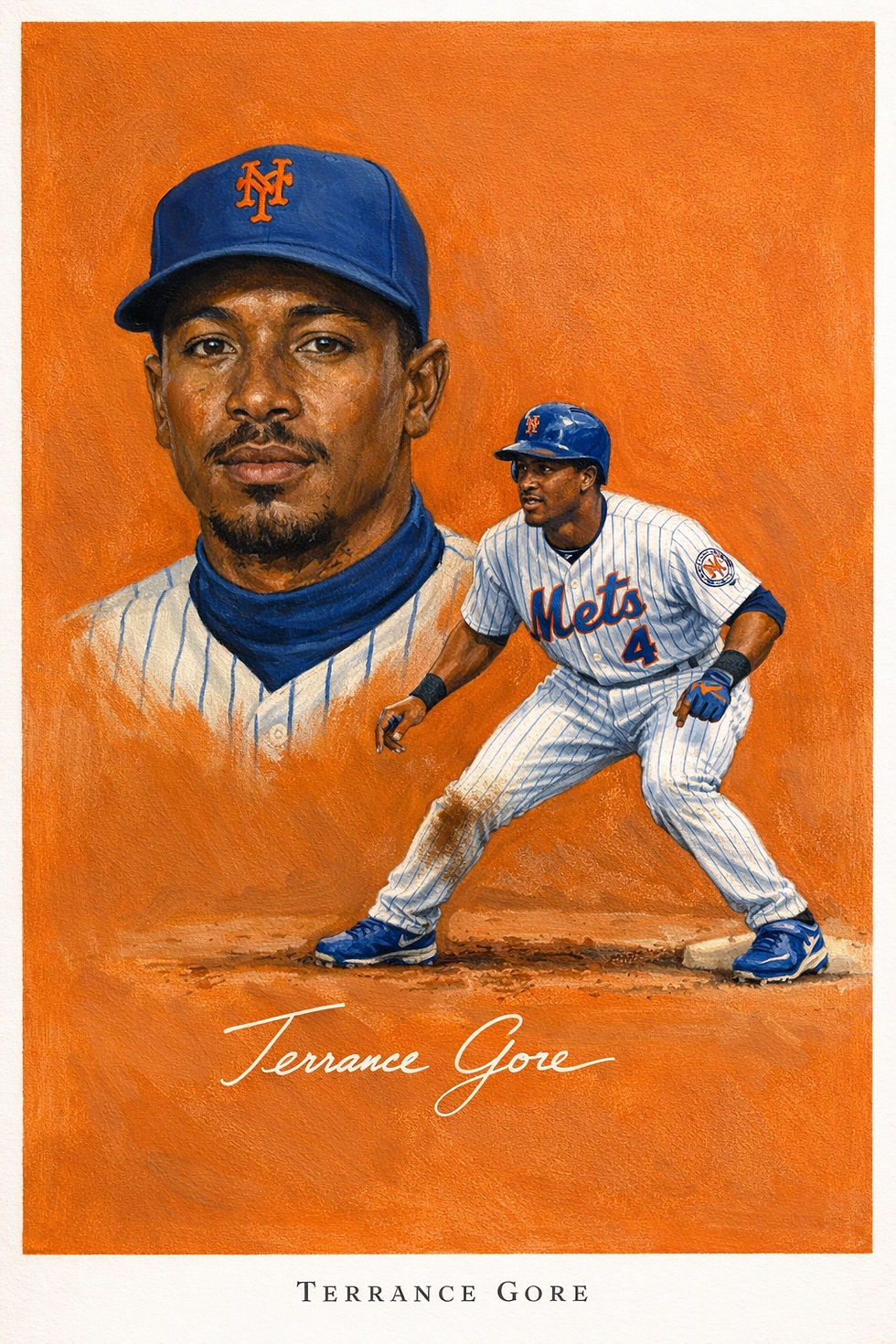Farewell to “The Cobra”: Dave Parker (1951‑2025)
- Mark Rosenman

- Jun 28, 2025
- 3 min read

Dave Parker always swung the bat like it owed him money, and Mets pitching usually picked up the tab. The Pittsburgh Pirates announced today, June 28, 2025, that their Hall‑of‑Fame right‑fielder has passed away at 74, just 29 days shy of standing on the Cooperstown stage at long last, finally receiving the ovation that had echoed too long in the on-deck circle. The man they called “Cobra” leaves behind an exit‑velocity résumé: 2,712 hits, 339 homers, 1,493 RBIs, a .290 lifetime average, seven All‑Star nods, three Gold Gloves, two rings—and a partridge in the Shea Stadium parking lot.
Parker terrorized Queens so often he practically qualified for rent control. In 182 games against the Mets he hit .280 with 192 knocks, 17 bombs and 96 RBIs—numbers that turned Ralph Kiner’s post‑game couch into his personal chaise. Even Tom Seaver felt the fangs: 22 hits in 78 at‑bats (.282) plus a healthy dent in Tom Terrific’s ERA.
I first crossed paths with Parker during Pirates BP in 1982. Armed with a notebook and the optimism of youth, I asked if he had time for a “short” interview. He grinned, fired back, “No—was that short enough?” and stalked off cackling. The echo lasted 14,185 days—until I finally landed an interview with him. He opened with a laugh: “It won’t work that way this time.” And it didn’t. We spent half an hour time‑traveling through his life, and talking about his autobiography "Cobra", and enough baseball lore to fill a Citi Field beer line.

From 1975‑79 Parker was a five‑tool hurricane: back‑to‑back batting titles, a 1978 MVP trophy, and 72 outfield assassinations—including 26 in ’77 alone. He signed the game’s first million‑dollar‑a‑year contract (deferred, but still headline gold), then watched it balloon into boos, batteries and a cocaine scandal that turned him from conquering hero to villain in Pittsburgh.
Yet Parker staged a Cincinnati comeback—34 homers and 125 RBIs in ’85—then DH‑ed the Bash Brothers to a title in ’89. Along the way he mentored young studs like Barry Larkin, Eric Davis and Gary Sheffield, proving the Cobra still had venom and wisdom in equal supply.
During our chat he spoke of Roberto Clemente, who taught him to “reach back” on throws (“That’s how you win assist titles, son”), and Willie Stargell, who filled Clemente’s leadership void with laughter and love. He recalled Pie Traynor wandering over after a 1971 BP line‑drive show to declare, “Never seen anything like that—closest is Stargell.” High praise from Cooperstown royalty.

He defended Pete Rose (“Hit King belongs in the Hall”) and stumped for fellow line‑drive artist Al Oliver. He called Steve Carlton the toughest pitcher he ever faced—“punched me out more than anybody, but I took him deep the most too… feast or famine.”
Met fans will never forget July 1978: ninth‑inning sac‑fly, John Stearns blocking the plate, Parker barreling home like Amtrak. “He was smiling,” Parker told me, still amused. “So the football player in me said, ‘Smile—take this.’” Jaw met shoulder pad; Shea gasped. Years later they laughed about it, but the collision still echoes in Flushing lore.

He shared a quieter feud with Wally Backman—sparked by a trot comment, ended by a spikes‑up slide. “Wally figured out trash‑talk economics real quick,” Parker deadpanned.
Cobra didn’t duck the cocaine years talk when asked. Parker admitted he started for pain relief, stayed for the party, and paid in reputation. “I thought it was a fad,” he said, “But it wasn’t.” He’s spent the last decade fighting Parkinson’s with the same defiance he once reserved for hanging curveballs, funneling book proceeds to the Dave Parker 39 Foundation.
Last December the Classic Baseball Era Committee righted an old wrong, sliding Parker’s name onto a Hall plaque beside Dick Allen’s. Mets fans everywhere muttered, “Great—like he hadn’t torched us enough already.” But justice is justice, and the Cobra’s numbers always belonged in bronze.
How you remember Dave Parker depends on the highlight loop you grew up watching:
The Superstar who could hit a ball to Hoboken, then throw it back to home on a line.
The Million‑Dollar Lightning Rod whose waistline and nightlife ballooned along with his paycheck.
The Late‑Career Mentor whose booming laugh filled clubhouses from Oakland to Milwaukee—and who finally gave this ink‑stained wretch the interview of a lifetime.
However you file him, Parker played full‑throttle, consequences be damned. And because baseball has the longest memory in sports, that tape‑measure homer off a beleaguered Mets arm—and that sardonic grin on Kiner’s couch—will spin forever in Flushing.
Rest easy, Cobra. The bases are yours now, and nobody’s throwing you out.
Here is my complete interview with Dave Parker :




You wish he played for your team. But I rooted against him did not mean I did not fear and respect Ed him but im a Mets fan